Unit 2 Let's play sports 第3课时 Grammar 同步课件 (42张PPT)
文档属性
| 名称 | Unit 2 Let's play sports 第3课时 Grammar 同步课件 (42张PPT) |  | |
| 格式 | pptx | ||
| 文件大小 | 47.3MB | ||
| 资源类型 | 教案 | ||
| 版本资源 | 牛津译林版 | ||
| 科目 | 英语 | ||
| 更新时间 | 2023-07-03 10:36:40 | ||
图片预览

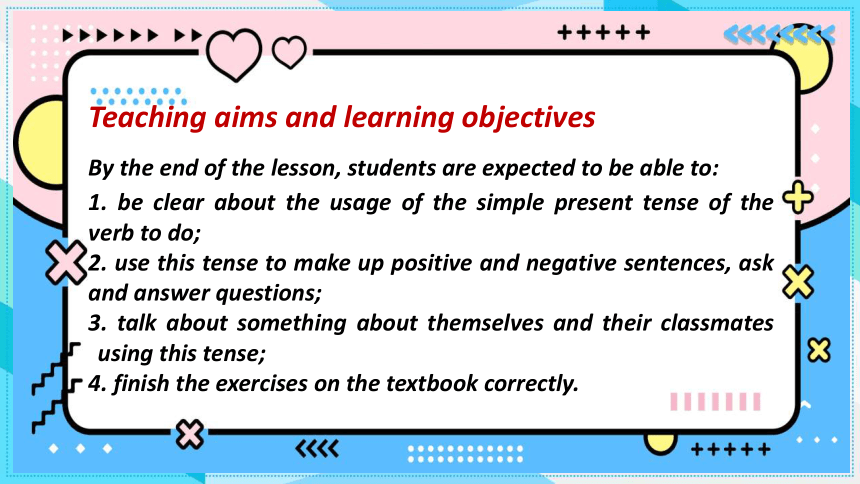



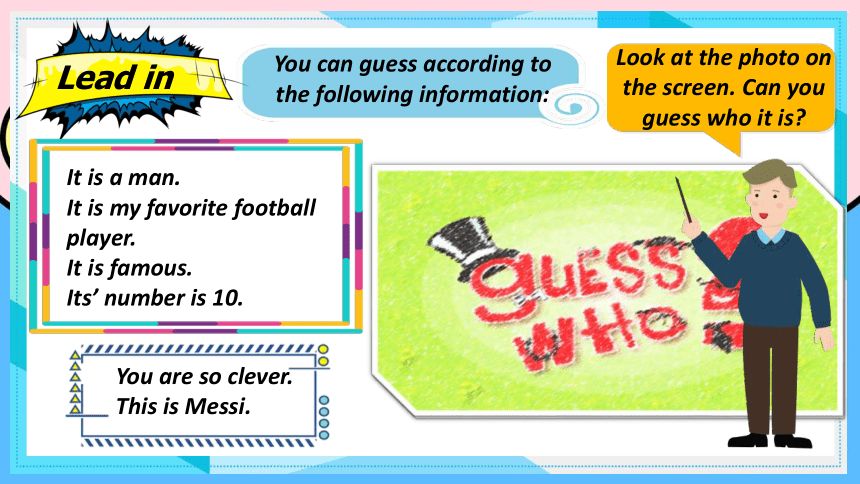
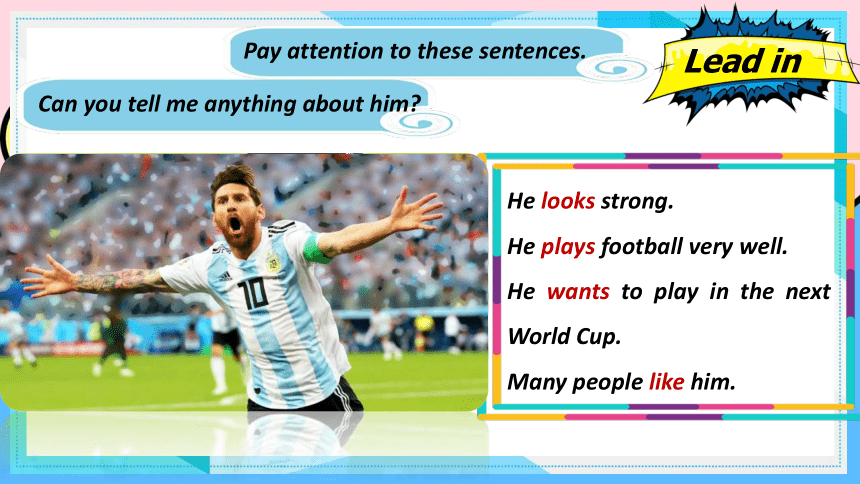

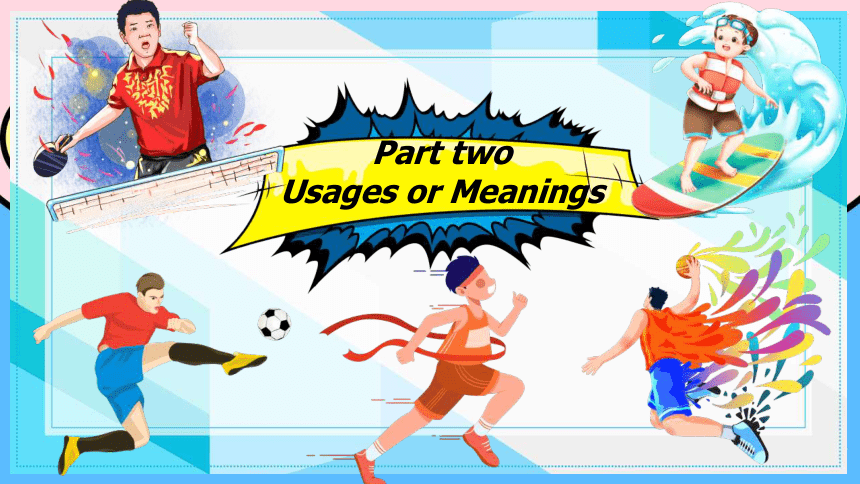
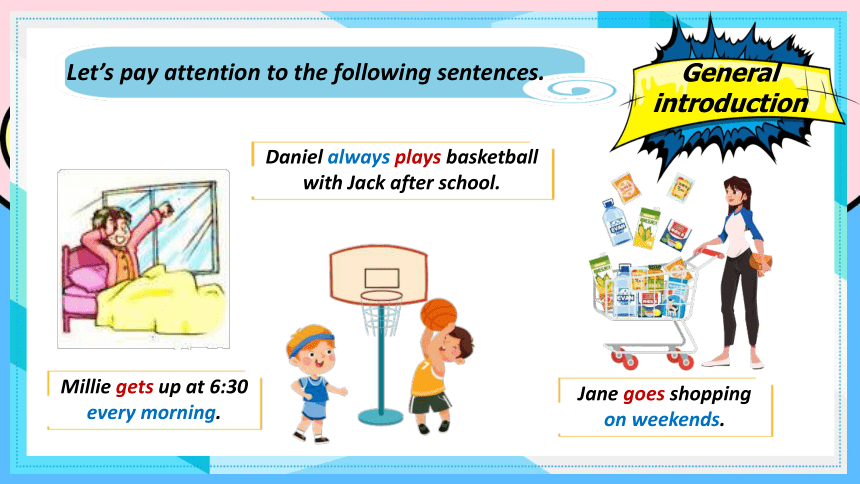

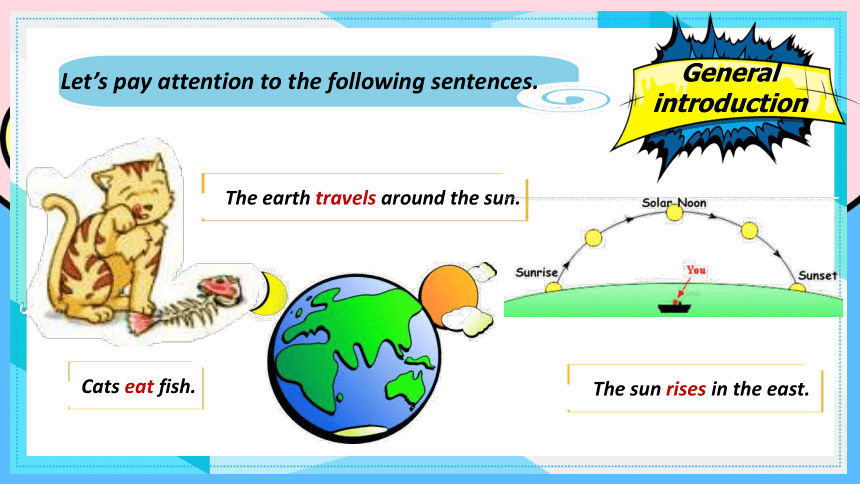
文档简介
Unit 2
Let’s play sports!
Grammar
Teaching aims and learning objectives
By the end of the lesson, students are expected to be able to:
1. be clear about the usage of the simple present tense of the verb to do;
2. use this tense to make up positive and negative sentences, ask and answer questions;
3. talk about something about themselves and their classmates using this tense;
4. finish the exercises on the textbook correctly.
Teaching contents
New words and phrases: drawing, weekend, at/on weekends, of course, shop
New structures: I/You/We/They like sports. He/She/It likes sports.
I/You/We/They do not/don’t like sports.
He/She/It does not/doesn’t like sports.
Do I/you/we/they like sports? Yes, you/I/we/they do.
No, you/I/we/they don’t.
Does he/she/it like sports? Yes, he/she/it does.
No, he/she/it doesn’t.
Focus of the lesson and predicted area of difficulty
Sum up how to use the simple present tense of the verb to do to make up positive and negative sentences, ask and answer questions.
Sum up the rules of the third person singular form.
Part one
Lead in
Look at the photo on the screen. Can you guess who it is?
You can guess according to the following information:
Lead in
It is a man.
It is my favorite football
player.
It is famous.
Its’ number is 10.
You are so clever.
This is Messi.
Lead in
Can you tell me anything about him?
He looks strong.
He plays football very well.
He wants to play in the next World Cup.
Many people like him.
Pay attention to these sentences.
Pay attention to the sentences.
He looks strong.
He plays football very well.
He wants to play in the next World Cup.
Many people like him.
All the sentences are written in the simple present tense of the verb “to do”.
Lead in
Part two
Usages or Meanings
General
introduction
Let’s pay attention to the following sentences.
Millie gets up at 6:30 every morning.
Daniel always plays basketball with Jack after school.
Jane goes shopping on weekends.
General
introduction
Millie gets up at 6:30 every morning.
Daniel always plays basketball with Jack after school.
Jane goes shopping on weekends.
米莉每天早上6:30起床。
丹尼尔放学后总是和杰克打篮球。
简在周末购物。
Introduction
---Meaning I
We use the simple present tense when we talk about things that we often do.(我们经常做的事情)
General
introduction
Let’s pay attention to the following sentences.
Cats eat fish.
The earth travels around the sun.
The sun rises in the east.
General
introduction
Cats eat fish.
The earth travels around the sun.
The sun rises in the east.
猫吃鱼
地球围着太阳转。
太阳从东方升起。
Introduction
---Meaning II
We use the simple present tense when we talk about things that are always true.(总是正确的事/客观事实/科学真理)
General
introduction
Let’s pay attention to the following sentences.
Simon likes playing football.
Sandy enjoys listening to music.
Amy thinks the question difficult.
General
introduction
Simon likes playing football.
Sandy enjoys listening to music.
Amy thinks the question difficult.
西蒙喜欢踢足球。
桑迪喜欢听音乐。
埃米认为这个问题很难。
Introduction
---Meaning III
We use the simple present tense when we talk about things that are true now.(目前现在对的事情/现在目前的状态)
Conclusion1
The usages or meanings of the simple present tense.
We use the simple present tense to talk about
我们经常做的事情
客观事实/科学真理
现在目前的事实/状态
Practice
---Matching
Match the given sentences with the correct usage
I go to school by bike every day.
I live in Wuxi.
I go to the Reading Club every Tuesday.
Daniel enjoys swimming.
The light travels faster than the sound.
Fish live in water.
Things that we often do
A
Things that are always true
B
Things that are true now
C
A
A
B
B
C
C
Part three
Positive sentences
The forms of positive sentences
Answer the following questions with the help of the pictures
How do you go to school?
Structure
We walk to school / We go to school on foot.
How do they go to school?
They ride to school / They go to school by bike.
What does monkey like?
Monkey/It likes bananas.
The forms of positive sentences
Answer the following questions with the help of the pictures
Structure
What do you do after school?
I go swimming after school.
What does she do after school?
She listens to music after school.
What does he do after school?
He plays football after school.
Structure
Sum up the forms of positive sentences
We walk to school / We go to school on foot.
They ride to school / They go to school by bike.
I go swimming after school.
She listens to music after school.
He plays football after school.
Monkey/It likes bananas.
主语(I/You/We/They/n.复)+v.原+其它。
主语(He/She/It/n.单)+v.三单+其它
Please pay attention to the third person singular form in this tense.
Rules of the third person singular form
Pay attention to the following sentences and work out the rules.
She listens to music after school.
He plays football after school.
Monkey/It likes bananas.
Rule No. 1
Most verbs: + s
Rules of the third person singular form
Pay attention to the following sentences and work out the rules.
Jack studies (study) English.
The bird flies (fly) in the sky.
Rule No. 2
Verbs ending in a consonant +y:
-y + ies
Rules of the third person singular form
Amy washes clothes.
She dresses up.(打扮)
Kitty watches film every night.
He fixes the car.
Rule No. 3
Verbs ending in “ch, sh, ss or x”:
+ es
Pay attention to the following sentences and work out the rules.
Rules of the third person singular form
Pay attention to the following sentences and work out the rules.
She goes to school by bus.
He does homework carefully.
Rule No. 4
Some verbs ending in o: + es
Conclusion2
The rules of the third person singular form.
We change have to has when it comes after he, she or it.
I have a ball.
She has a ball.
Rule No. 1:
Most verbs: + s
Rule No. 2:
Verbs ending in a consonant +y: -y + ies
Rule No. 3:
Verbs ending in “ch, sh, ss or x”: + es
Rule No. 4:
Some verbs ending in o: + es
Practice
put ______
enjoy ______
teach ______
______ fly
______ guess
______ match
go ______
study ______
carry ______
______ worry
______ have
______ stay
puts
flies
goes
worries
enjoys
guesses
studies
has
teaches
matches
carries
stays
Please write the third person singular form of given words
Part four
Negative & Question
sentences
Structure
Simon and Millie are talking about sports. Read their dialogue, and pay attention to the words in red.
Simon: I like basketball very much. How about you?
Millie: Yes, I do. But I don’t like football.
Simon: Does your sister like football?
Millie: No, she doesn’t (like football). She likes basketball, too.
Simon: Do your parents often watch basketball games on TV?
Millie: Yes, they do.
否定形式:
don’t/doesn’t
Conclusion 3
I/You/We/They like sports.
I/You/We/They do not like sports.
don’t
She/He/It likes football.
She/He/It does not like football.
doesn’t
The rules of forming negative sentences.
一般现在时态下的实意行为动词变否定:I/You/We/They人称用do not+v.原;
She/He/It 人称用does not+v.原;
do not=don’t; does not = doesn’t
Structure
Please make sentences like the following ones:
I like playing tennis, but my sister doesn’t like playing it.
My brother likes watching ball games, but his friends don’t like watching ball games.
A like/likes doing…, but B don’t/doesn’t like doing ….
Use the sentence structure above to make some sentences.
Structure
Please pay attention to the sentences in red.
They are the forms of questions and answers in simple present tense
Simon: I like basketball very much. How about you?
Millie: Yes, I do. But I don’t like football.
Simon: Does your sister like football?
Millie: No, she doesn’t (like football). She likes basketball, too.
Simon: Do your parents often watch basketball games on TV?
Millie: Yes, they do.
Conclusion 4
The forms of questions and answers in simple present tense
一般现在时态下实意行为动词的疑问句及回答:
①助动词Do +I/you/we/they/n.复数+v.原+其他?
Yes, sb. do. / No, sb. do not(don’t).
②助动词Does +he/she/it/n.单数+v.原+其他?
Yes, sb. does. / No, sb. does not(doesn’t).
Part five
Practice
Practice
like
dances
goes
plays
watches
Practice
Does
No, she doesn’t.
Does
Yes, she does.
Does
No, he doesn’t.
Do
No, they don’t.
Practice
Do
play
play
Do
go
watches
reads
shops
stay
go
Part five
Consolidation
Consolidation
Interview your partner
After summing up the forms, I’d like all of you to make a dialogue with your partner. Here is a model:
A: I like playing … Do you like it?
B: …
A: Does your father play … in his free time?
B: …
A: Does your mum like doing sports?
B: …
A: Do your family watch ball games on TV?
B: …
Consolidation
Talk with your partner and make a speech about the hobby of your partner and his/her family.
You can get some help from the following sentences.
My partner’s name is …
He/She enjoys … in his/her free time.
He/She doesn’t like …
His/Her father enjoys … at weekends.
He often … at weekends.
His/Her mother likes … after work.
She sometimes …
They like …
They don’t like …
Part six
Homework
Homework
1. Write a passage to introduce the hobby of your partner and his/her family.
2. Finish the exercises on the exercise book.
Let’s play sports!
Grammar
Teaching aims and learning objectives
By the end of the lesson, students are expected to be able to:
1. be clear about the usage of the simple present tense of the verb to do;
2. use this tense to make up positive and negative sentences, ask and answer questions;
3. talk about something about themselves and their classmates using this tense;
4. finish the exercises on the textbook correctly.
Teaching contents
New words and phrases: drawing, weekend, at/on weekends, of course, shop
New structures: I/You/We/They like sports. He/She/It likes sports.
I/You/We/They do not/don’t like sports.
He/She/It does not/doesn’t like sports.
Do I/you/we/they like sports? Yes, you/I/we/they do.
No, you/I/we/they don’t.
Does he/she/it like sports? Yes, he/she/it does.
No, he/she/it doesn’t.
Focus of the lesson and predicted area of difficulty
Sum up how to use the simple present tense of the verb to do to make up positive and negative sentences, ask and answer questions.
Sum up the rules of the third person singular form.
Part one
Lead in
Look at the photo on the screen. Can you guess who it is?
You can guess according to the following information:
Lead in
It is a man.
It is my favorite football
player.
It is famous.
Its’ number is 10.
You are so clever.
This is Messi.
Lead in
Can you tell me anything about him?
He looks strong.
He plays football very well.
He wants to play in the next World Cup.
Many people like him.
Pay attention to these sentences.
Pay attention to the sentences.
He looks strong.
He plays football very well.
He wants to play in the next World Cup.
Many people like him.
All the sentences are written in the simple present tense of the verb “to do”.
Lead in
Part two
Usages or Meanings
General
introduction
Let’s pay attention to the following sentences.
Millie gets up at 6:30 every morning.
Daniel always plays basketball with Jack after school.
Jane goes shopping on weekends.
General
introduction
Millie gets up at 6:30 every morning.
Daniel always plays basketball with Jack after school.
Jane goes shopping on weekends.
米莉每天早上6:30起床。
丹尼尔放学后总是和杰克打篮球。
简在周末购物。
Introduction
---Meaning I
We use the simple present tense when we talk about things that we often do.(我们经常做的事情)
General
introduction
Let’s pay attention to the following sentences.
Cats eat fish.
The earth travels around the sun.
The sun rises in the east.
General
introduction
Cats eat fish.
The earth travels around the sun.
The sun rises in the east.
猫吃鱼
地球围着太阳转。
太阳从东方升起。
Introduction
---Meaning II
We use the simple present tense when we talk about things that are always true.(总是正确的事/客观事实/科学真理)
General
introduction
Let’s pay attention to the following sentences.
Simon likes playing football.
Sandy enjoys listening to music.
Amy thinks the question difficult.
General
introduction
Simon likes playing football.
Sandy enjoys listening to music.
Amy thinks the question difficult.
西蒙喜欢踢足球。
桑迪喜欢听音乐。
埃米认为这个问题很难。
Introduction
---Meaning III
We use the simple present tense when we talk about things that are true now.(目前现在对的事情/现在目前的状态)
Conclusion1
The usages or meanings of the simple present tense.
We use the simple present tense to talk about
我们经常做的事情
客观事实/科学真理
现在目前的事实/状态
Practice
---Matching
Match the given sentences with the correct usage
I go to school by bike every day.
I live in Wuxi.
I go to the Reading Club every Tuesday.
Daniel enjoys swimming.
The light travels faster than the sound.
Fish live in water.
Things that we often do
A
Things that are always true
B
Things that are true now
C
A
A
B
B
C
C
Part three
Positive sentences
The forms of positive sentences
Answer the following questions with the help of the pictures
How do you go to school?
Structure
We walk to school / We go to school on foot.
How do they go to school?
They ride to school / They go to school by bike.
What does monkey like?
Monkey/It likes bananas.
The forms of positive sentences
Answer the following questions with the help of the pictures
Structure
What do you do after school?
I go swimming after school.
What does she do after school?
She listens to music after school.
What does he do after school?
He plays football after school.
Structure
Sum up the forms of positive sentences
We walk to school / We go to school on foot.
They ride to school / They go to school by bike.
I go swimming after school.
She listens to music after school.
He plays football after school.
Monkey/It likes bananas.
主语(I/You/We/They/n.复)+v.原+其它。
主语(He/She/It/n.单)+v.三单+其它
Please pay attention to the third person singular form in this tense.
Rules of the third person singular form
Pay attention to the following sentences and work out the rules.
She listens to music after school.
He plays football after school.
Monkey/It likes bananas.
Rule No. 1
Most verbs: + s
Rules of the third person singular form
Pay attention to the following sentences and work out the rules.
Jack studies (study) English.
The bird flies (fly) in the sky.
Rule No. 2
Verbs ending in a consonant +y:
-y + ies
Rules of the third person singular form
Amy washes clothes.
She dresses up.(打扮)
Kitty watches film every night.
He fixes the car.
Rule No. 3
Verbs ending in “ch, sh, ss or x”:
+ es
Pay attention to the following sentences and work out the rules.
Rules of the third person singular form
Pay attention to the following sentences and work out the rules.
She goes to school by bus.
He does homework carefully.
Rule No. 4
Some verbs ending in o: + es
Conclusion2
The rules of the third person singular form.
We change have to has when it comes after he, she or it.
I have a ball.
She has a ball.
Rule No. 1:
Most verbs: + s
Rule No. 2:
Verbs ending in a consonant +y: -y + ies
Rule No. 3:
Verbs ending in “ch, sh, ss or x”: + es
Rule No. 4:
Some verbs ending in o: + es
Practice
put ______
enjoy ______
teach ______
______ fly
______ guess
______ match
go ______
study ______
carry ______
______ worry
______ have
______ stay
puts
flies
goes
worries
enjoys
guesses
studies
has
teaches
matches
carries
stays
Please write the third person singular form of given words
Part four
Negative & Question
sentences
Structure
Simon and Millie are talking about sports. Read their dialogue, and pay attention to the words in red.
Simon: I like basketball very much. How about you?
Millie: Yes, I do. But I don’t like football.
Simon: Does your sister like football?
Millie: No, she doesn’t (like football). She likes basketball, too.
Simon: Do your parents often watch basketball games on TV?
Millie: Yes, they do.
否定形式:
don’t/doesn’t
Conclusion 3
I/You/We/They like sports.
I/You/We/They do not like sports.
don’t
She/He/It likes football.
She/He/It does not like football.
doesn’t
The rules of forming negative sentences.
一般现在时态下的实意行为动词变否定:I/You/We/They人称用do not+v.原;
She/He/It 人称用does not+v.原;
do not=don’t; does not = doesn’t
Structure
Please make sentences like the following ones:
I like playing tennis, but my sister doesn’t like playing it.
My brother likes watching ball games, but his friends don’t like watching ball games.
A like/likes doing…, but B don’t/doesn’t like doing ….
Use the sentence structure above to make some sentences.
Structure
Please pay attention to the sentences in red.
They are the forms of questions and answers in simple present tense
Simon: I like basketball very much. How about you?
Millie: Yes, I do. But I don’t like football.
Simon: Does your sister like football?
Millie: No, she doesn’t (like football). She likes basketball, too.
Simon: Do your parents often watch basketball games on TV?
Millie: Yes, they do.
Conclusion 4
The forms of questions and answers in simple present tense
一般现在时态下实意行为动词的疑问句及回答:
①助动词Do +I/you/we/they/n.复数+v.原+其他?
Yes, sb. do. / No, sb. do not(don’t).
②助动词Does +he/she/it/n.单数+v.原+其他?
Yes, sb. does. / No, sb. does not(doesn’t).
Part five
Practice
Practice
like
dances
goes
plays
watches
Practice
Does
No, she doesn’t.
Does
Yes, she does.
Does
No, he doesn’t.
Do
No, they don’t.
Practice
Do
play
play
Do
go
watches
reads
shops
stay
go
Part five
Consolidation
Consolidation
Interview your partner
After summing up the forms, I’d like all of you to make a dialogue with your partner. Here is a model:
A: I like playing … Do you like it?
B: …
A: Does your father play … in his free time?
B: …
A: Does your mum like doing sports?
B: …
A: Do your family watch ball games on TV?
B: …
Consolidation
Talk with your partner and make a speech about the hobby of your partner and his/her family.
You can get some help from the following sentences.
My partner’s name is …
He/She enjoys … in his/her free time.
He/She doesn’t like …
His/Her father enjoys … at weekends.
He often … at weekends.
His/Her mother likes … after work.
She sometimes …
They like …
They don’t like …
Part six
Homework
Homework
1. Write a passage to introduce the hobby of your partner and his/her family.
2. Finish the exercises on the exercise book.
同课章节目录
- 预备课程
- Lesson 1 Nice to meet you !
- Lesson 2 A happy family
- Lesson 3 A nice school
- Lesson 4 You look cool !
- Lesson 5 Wonderful things
- Lesson 6 Have nice food
- Lesson 7 Enjoy our days
- Lesson 8 Let's have fun !
- Unit 1 This is me
- Unit 2 Let's play sports
- Unit 3 Welcome to our school
- Unit 4 My day
- Unit 5 Let’s celebrate
- Unit 6 Food and lifestyle
- Unit 7 Shopping
- Unit 8 Fashion
